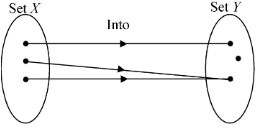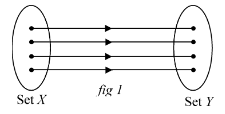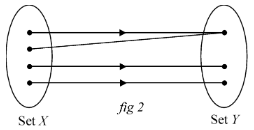
Classification of Function
Relation and function of Class 12
Function can be classified into two categories:
- One-one or Many-one
- Into or Onto
Each of above category comprises entire gamut of function. Thus if a function is not one-one, it has to be many-one and vice-versa.
Similarly if function is into then it cannot be onto and converse.
(i) One-one functions (Injective)
A function is said to be one - one if for every value of x in the Domain, there exists one and only one value in co-domain.
|
|
Note
Two different values of x do not have same value of y.
e.g.
(a) f(x) =  is one to one on any domain of non-negative numbers because
is one to one on any domain of non-negative numbers because  whenever x1 ≠ x2.
whenever x1 ≠ x2.
(b) g(x) = sin x is not one-to-one because for many different values of x we get same value of g(x).
(ii) Many-one functions
A function is said to be many-one if there exists at least two elements in domain which have same image in co-domain.
|
|
(iii) Into functions
(b) g(x) = sin x is not one-to-one because for many different values of x we get same value of g(x).
(ii) Many-one functions
A function is said to be many-one if there exists at least two elements in domain which have same image in co-domain.
|
|
(iii) Into functions
If there exist at least one element in co-domain which doesn't have a pre-image then such function are said to be into.

(iv) Onto functions (Surjective)
If there doesn't exist any element in co-domain which does'nt have a pre-image then such functions are said to be onto. Note that for onto function co-Domain ≡ Range.
.png)
Based on above two categories of function, we can classify the function into four type
(i) One-one and Onto (Bijective)
(ii) One-one and Into
(iii) Many-one and Onto
(iv) Many-one and Into.


